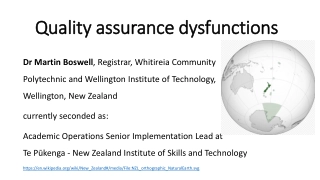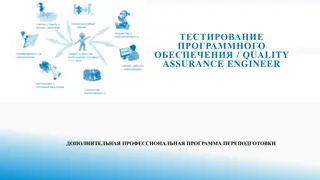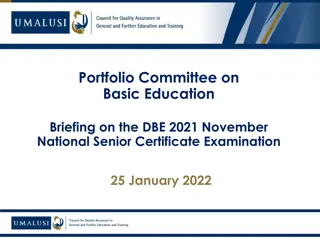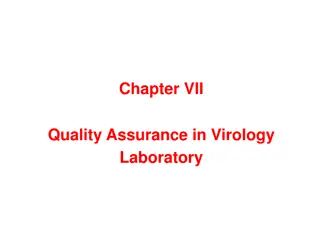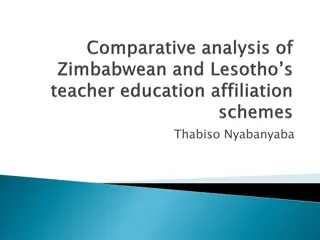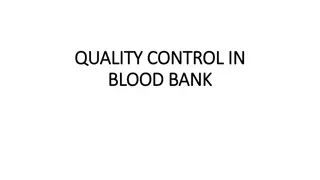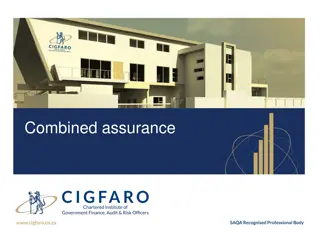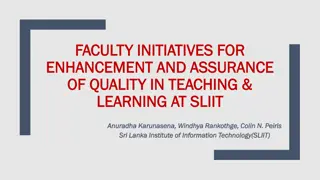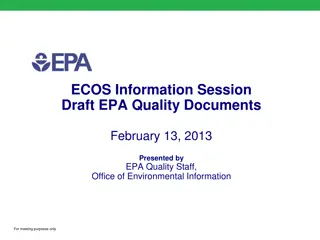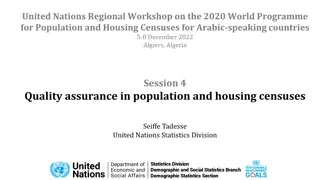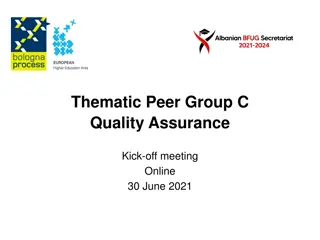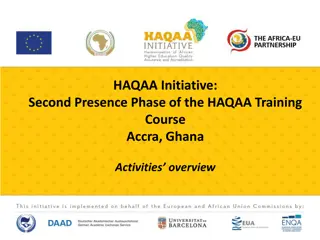Quality Assurance in Higher Education: A Focus on Bangladesh
Explore the importance of quality assurance in higher education through the lens of initiatives in Bangladesh, including QA mechanisms, the mission for quality education, and the socio-economic impact. Learn how stakeholders aim to foster a culture of quality and continuous improvement in universities to meet the country's workforce needs and economic growth aspirations.
Download Presentation

Please find below an Image/Link to download the presentation.
The content on the website is provided AS IS for your information and personal use only. It may not be sold, licensed, or shared on other websites without obtaining consent from the author. Download presentation by click this link. If you encounter any issues during the download, it is possible that the publisher has removed the file from their server.
E N D
Presentation Transcript
Quality Assurance in Higher Education Mohammad Sahadet Hossain, PhD Additional Director Institutional Quality Assurance Cell (IQAC) North South University Meet the SACs; 2nd June 2016.
Quality Assurance in the system of Higher Education Meet the SACs; 2nd June 2016.
The session will include The session will include Quality & Quality Culture in HEI Quality & Quality Culture in HEI QA Mechanism in Bangladesh QA Mechanism in Bangladesh Quality Control (QC) & Quality Assurance (QA) Quality Control (QC) & Quality Assurance (QA) Self Assessment (SA) in QA Self Assessment (SA) in QA Self Assessment Committee (SAC) Activities Self Assessment Committee (SAC) Activities The continuation of QA Culture The continuation of QA Culture IQAC, NSU
Quality & Quality Culture Quality & Quality Culture Quality Quality can not be Seen Very Very What What is is Quality Quality ? ? Smelt difficult to difficult to understand understand but easy to but easy to talk about talk about Touched Sold purchased IQAC, NSU
What is Quality ? Quality is to be Quality is to be felt by all the stake holders visible every where a continuous process and quality can definitely be felt / assessed IQAC, NSU
Why Quality in Education? The graduates must come out of the university equipped with requisite qualifications and skills that the society and the country need for achieving higher economic growth and prosperity. Here quality of graduates has been defined as, fitness of purposes (Woodhouse, 1999).Quality education includes (UNICEF, 2000) Source: UGC IQUA manual. IQAC, NSU
QA Mechanism in Bangladesh Quality Higher education is necessary for the socioeconomic development of a country as it produces skilled workforce for the country. The number of students at tertiary level in Bangladesh is approximately 3.0 million. There are around 37 public and 91 private universities in Bangladesh. Achieving quality in higher education is now the mission of the Government of Bangladesh (GOB). The GOB, World bank has generously funded the project named- Higher Education Quality Enhancement Project (HEQEP), implemented by University Grants Commission. Quality Assurance Unit (QAU) is a part of HEQEP established at UGC to oversee the Quality Assurance (QA) activities at university level. IQAC, NSU
And the real picture.. Prothom Alo- 21st May, 2016 Prothom Alo-29th March 2016 IQAC, NSU
Quality Assurance Principles (some major) Responsibility: QA system of a HEI is primarily responsible for quality assurance in education; Focus: on safeguarding the interests of the major stakeholders; Involvement: Participation of all who are involved in the process of Purpose: Quality assurance is not to prove anything but to improve; Commitment: Commitment to continuous improvement; Continuity: Quality Assurance is a dynamic and continuous process; Flexibility: QA system need to be flexible enough to accept and accommodate feedback from a variety of internal and external constituencies; Fairness: Decisions and measures taken to redress problems and improve the process need to be supported by adequate information and evidences; Transparency: QA system need to be transparent in all aspects of its activities including the academic and financial matters. IQAC, NSU
Self-Assessment Committee (SAC) o The SAC will function its activities for one year. o In one year period, the SAC will conduct the self assessment, submit the self assessment report (SAR), facilitate the external peer review and finally prepare an improvement plan o The SAC will work with IQAC to develop the overall QA condition of the department o The SAC will make sure that all the QA activities undertaken by the IQAC and applicable for the entity are being implemented properly. IQAC, NSU
SELF ASSESSMENT AT DEPARTMENT LEVEL Program self assessment is the systematic collection , review and use of information about educational programs undertaken for the improvement of student learning. It helps the department to : Better understand the ongoing programs under assessment Revisit the program objectives and goals Redress the intended learning outcomes of the program if necessary Conduct SWOT analysis Assess the adequacy of student support services for effective teaching learning Assess the progress of improvement desired Develop strategic plan with commitment and priorities for further improvement IQAC, NSU
SELF ASSESSMENT CRITERIA AND STANDARD Governance Curriculum content design and review Student admission, progress and achievements Physical facilities Teaching-learning assessment Student support services Staff and facilities Research and extension Process management and continuous improvement IQAC, NSU
INDICATIVE ALLOCATION TO ACADEMIC DEPARTMENTS Incentive for the 3 member SA Committee Workshops (three workshops) Printing and Stationary Survey including questionnaire preparation, data collection, data analysis and TA/DA for the faculty members involved in field work Peer Review Operating cost/contingencies Tk. 320,000 Tk. 120,000 Tk. 10,000 Tk. 243,800 Tk. 250,000 Tk. 15,000 Total Tk 958,800 IQAC, NSU
SAC INCENTIVE Incentive: 4 months basic pay for the Head, 2 months basic pay for the members Incentive according to public university pay scale for respective rank IQAC, NSU
SAC ACTIVITIES FOR ONE YEAR Prepare a self assessment activity schedule Organize awareness building workshops Prepare the survey tools for major stakeholders i.e. students, alumni, employers, staffs, non academic staffs etc. Conduct the surveys Prepare and analyze the data and prepare SAR Organize workshop to share SAR findings Propose the panel for external peer review to IQAC and conduct the external review Prepare the improvement plan based on internal assessment and external peer review The improvement plan will be submitted to the IQAC IQAC, NSU
AFTER ONE YEAR ! The SA process will run for five years. The first year is for assessments and design of improvement plans, and the next four years for implementation of improvement plans. As the primary objective of the funding is to establish quality culture at department level and institution level, we hope NSU will continue the process and gradually implement the improvement plan on its own. Thank You !! IQAC, NSU




